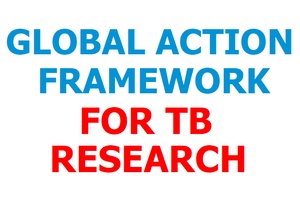WHO launches Global Action Framework for TB Research and creates new team on TB research
A new Global Action Framework for TB Research will foster high-quality national and global TB research needed to end the TB epidemic. A new Research for TB Elimination team, set up in the WHO Global TB Programme, will facilitate the implementation of this new framework and support the promotion of TB research both at global and country levels.
November 17, 2015 - WHO today launched a new Global Action Framework for TB Research to foster high-quality national and global TB research needed to end the TB epidemic. To facilitate the implementation of this new framework and to support the promotion of TB research both at global and country levels, a new research team has been set up in the WHO Global TB Programme.
There has been important progress in the fight against TB with
the 2014 death rate nearly half that of 1990. Effective
diagnosis and treatment saved 43 million lives between 2000 and
2015. However, TB now ranks alongside HIV/AIDS as a top
infectious killer, claiming 1.5 million lives every year
(including 0.4 million among people living with HIV) and causing
suffering for millions more.
The WHO End TB
Strategy, adopted by all WHO Member States in 2014, aims to
reduce TB incidence by 80% and TB deaths by 90%, as well as
achieve 100% protection against catastrophic costs for
TB-affected households.
Intensified research and innovation is one of the three
pillars of the new Strategy.
“Research is
critical to break the trajectory of the epidemic and reach the
global End TB targets. Without research we will not have the
necessary tools to drive down deaths and suffering as targeted
by the End TB Strategy”, said Dr Mario Raviglione,
Director of the WHO Global TB Programme. “Countries with
the biggest burdens of disease must be leaders in driving more
energy and investment in research.”
The
Global Action Framework for TB Research outlines steps
and benchmarks for key stakeholders at global and national
levels to advance research, particularly in the countries
carrying the greatest burdens of disease. The steps include:
development of national plans for TB research based on mapping
of existing efforts; consensus on top priorities;
capacity-building; and activating domestic research funding
mechanisms complementing other resources. It is expected that
every country can pursue the principles outlined in the
Framework. At global level the framework calls for: enhanced
mobilization of public and private institutions to become
involved in TB research and research funding; novel ways of
mobilizing resources; and expanded effective interaction through
the establishment of international networks of researchers and
institutions. The framework was developed based on the
recommendations of a global consultation on research to
eliminate TB, held in Stockholm in late 2014, and sponsored by
WHO, the Swedish Government and the Karolinska Institutet,
Sweden.
“To accelerate progress against
TB, research must be prioritized and reinvigorated. The
discovery and development of new and more efficient tools and
delivery strategies will be essential to achieve immediate and
lasting gains against the epidemic,“ said Dr Gilla Kaplan,
Director of the TB program at the Bill & Melinda Gates
Foundation. The Bill & Melinda Gates Foundation is
supporting WHO’s efforts to help roll-out the Framework
and provide assistance to countries.
To
facilitate the implementation of the framework, the WHO Global
TB Programme has created a new team in the Director’s
office. In collaboration with partner research agencies, the
team will provide support to high TB burden countries to
stimulate, develop and strengthen activities on TB research and
roll-out of new tools. It will promote and catalyse TB research
and innovation through facilitated discussions on research
priorities, and contribute to the development of international
networks for research and capacity building.
This
new “Research for TB Elimination” team will
be led by Dr Christian Lienhardt, Senior Research Adviser in the
Global TB Programme. The new workstream has emerged out of the
work successfully undertaken over the last two years within the
Policy, Strategy and Innovation Unit at the Global TB Programme.
All units in the Programme will work closely with this new team
to promote and facilitate relevant research.
“With
this move, WHO strongly reaffirms its commitment to promote
research in collaboration with all key stakeholders, for the
benefit of all people affected by TB worldwide,” said Dr
Christian Lienhardt.
Download:


